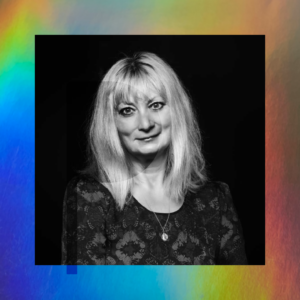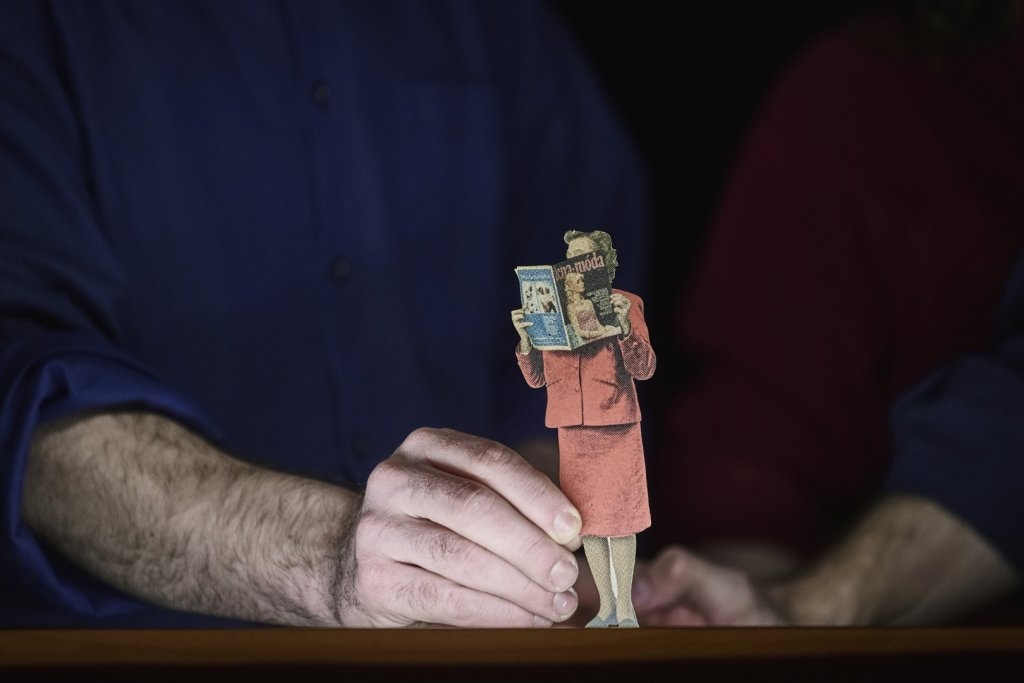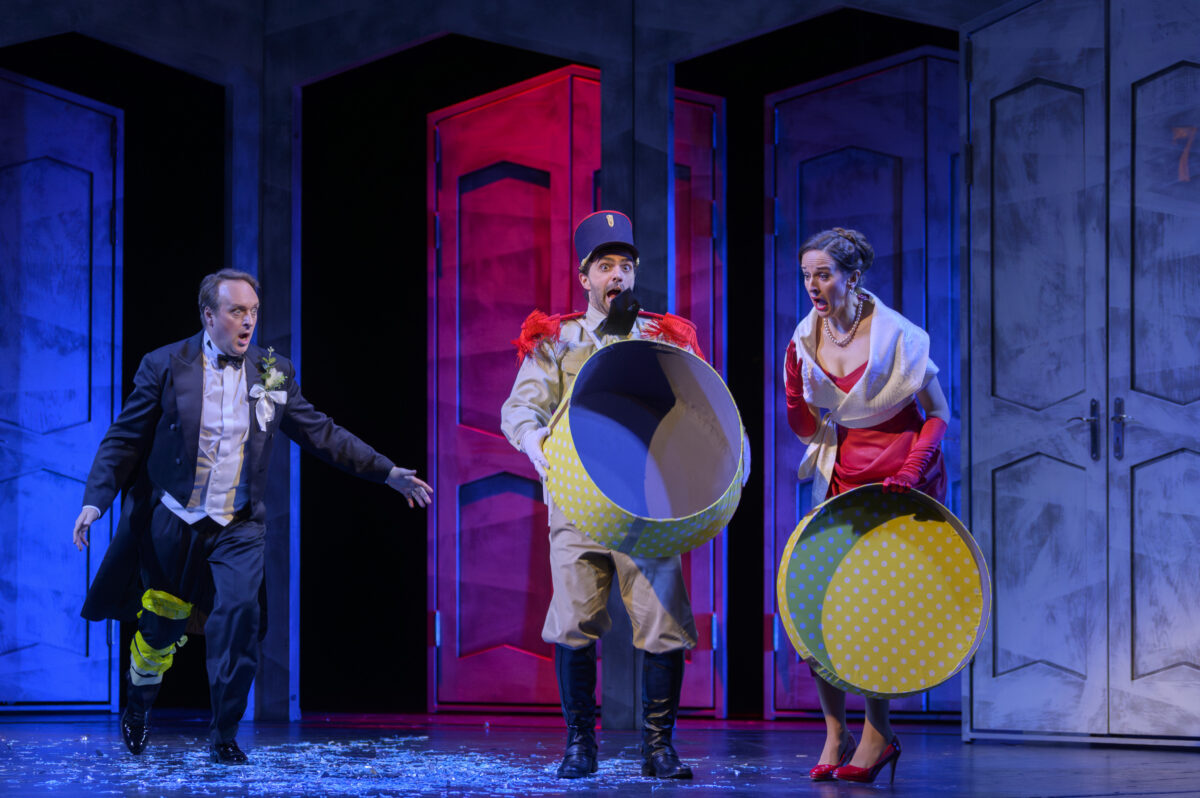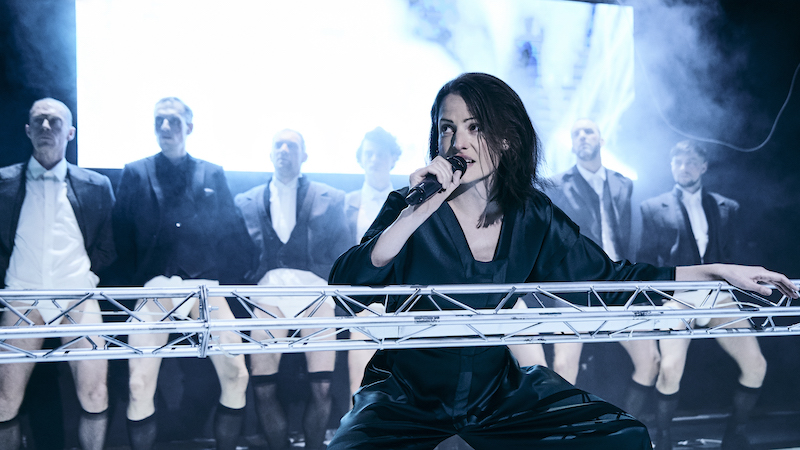Jana Machalická
Modern Czech theatre has rarely rejected quality authors simply for being citizens of an imperialist, usurping nation whose lust for power we have experienced firsthand. It is essentially the same today, when all of Europe is experiencing a kind of déjà vu. Czech theatres remain unbiased and perform the work of Russian authors, both classic and contemporary; it is the quality and content that is important. In contrast to the past regime, today there is no need for concern that authors have been forcibly programmed for ideological reasons. In fact, the reverse is true; Czech theatre is highly sensitive to any kind of censorship.
If we look to the past, there was no particular desire to present works by Russian authors in the immediate aftermath of the 1968 Soviet occupation, but nor were they anathema. While the 1960s ended on an unfortunate note for Czechoslovakia, the popularity of Russian classics with Czech directors throughout the decade was no mistake. Top domestic directors such as Otomar Krejča and Jan Kačer knew very well that authors like Anton Pavlovich Chekhov, Nikolai Vasilievich Gogol (a Ukrainian by birth) and Fyodor Mikhailovich Dostoevsky were well-acquainted with the soul of the great nation to the east and had experienced the bleakness and all-pervading marasmus of that empire. It was Chekhov who, during the totalitarian days of the late 1950s and early 1960s, opened up a space in the Czech theatre that was impervious to censorship, as Jaroslav Vostrý points out in his book about the Drama Club. Krejča’s productions of Russian classics in the 1960s and early 1970s (The Seagull, Ivanov, Three Sisters) rank among the best interpretations of their time. Additionally, Theatre beyond the Gate, which was forced to close by the communist regime, staged Chekhov’s The Seagull as its final production in 1972. It is also significant that the main role of Arkadina was played by Vlasta Chramostová, who the regime subsequently banned from the theatre for twenty years. Jan Kačer was another director who turned to Russian classics as a means of commenting on the state of a world devastated by the 1968 Soviet occupation. He presented a number of excellent productions at the Drama Club, beginning with Gogol’s The Government Inspector (1967) and continuing with Chekhov’s dramas The Cherry Orchard and Uncle Vanya. Even Alfréd Radok turned to Russian classics in the 1960s, staging a memorable production of Gogol’s Marriage.
Czech artists did not avoid Russian authors even in the normalisation years of the 1970s and 1980s; it was one of the paradoxes of the time that directors relegated to the regions by the regime produced excellent productions of Russian classics – for example, Jan Grossman in Cheb (The Seagull, The Cherry Orchard) or Miloš Hynšt in Uherské Hradiště (Ostrovsky’s The Forest, The Cherry Orchard). Even the increasingly popular studio theatres could not do without Russian titles; they served as a great inspiration, and remarkable adaptations also emerged. At Brno’s Divadlo na provázku (Theatre on a String), Peter Scherhaufer presented his celebrated Karamazovci based on Dostoevsky’s novel The Brothers Karamazov, Divadelní román, based on Bulgakov’s Theatrical Novel and 11 dní křižníku Kníže Potěmkin Tauričevsky (Eleven Days on the Cruiser Potemkin Taurichevsky), inspired by Eisenstein’s film and other sources, as well as the creative team’s interest – in the post-1968 context – in failed revolutions. Sviť, sviť, má hvězdo, Scherhaufer’s theatrical version of Alexander Mitta’s film Shine, Shine, My Star, was also successful.
In mapping today’s situation, it must be said that the dramaturgy of Czech theatres is generally less interested in classical titles and more concerned with original adaptations and non-traditional texts; this “death” of classics has thus also resulted in fewer presentations of Russian playwrights and is unrelated to the political situation. However, topics relating to Russian life, recent or contemporary politics or the state of society are all the more appealing to theatre makers and audiences today, since we experience the new surge in Russia’s ambitions for power as an imminent threat to our independence, and analysing the root causes of this state of affairs has a great dramatic charge. This is evidenced by the most successful production of the recent period – Moskoviáda (The Moscoviad) by Ukrainian author Yuri Andruchovych, staged at Divadlo X10 by Dušan David Pařížek.[1] Andruchovych wrote The Moscoviad in the early 1990s, when Ukraine seceded from the Soviet Union. With the change in the political situation, this half-forgotten novella has attained an unbelievable relevance, because it reflects on Russia’s endless desire for power and also analyses, to some extent, the reasons for the decline of post-Soviet society. Pařízek perfectly senses not only the timelessness but also the grotesqueness of the text.
The events of the novel take place on a single day in Moscow, and its protagonist is Otto von F., a Ukrainian poet and patriot, as well as a boozer, a great talker and a lover of women. It all begins at a literary dormitory in a Moscow skyscraper, where various characters who would like to become famous writers labour in an imperial capital built on sand. Otto’s journey of initiation through the city to meet a dissident friend who publishes an independent newspaper meanders through drunken stopovers and repeated attempts to buy something for his friend’s children in the “Children’s World” shopping centre, where only paper doves are in stock. Eventually, the sad hero makes his way via the toilets to a kind of purgatory in the form of a secret government metro line and then on to a conspiracy centre of the dead who are fighting to preserve the Soviet Union. Andruchovych brilliantly combines phantasmagoric moments with expertly observed reality and observations on the nature of the Soviet colossus. He captures the hopelessness of an empire that has devoured neighbours near and far but no longer knows what to do with itself and is crumbling internally, even as its exterior remains menacing. The wild journey through a Moscow full of spectral meanderings contains something of Bulgakov or the poetry of Jáchym Topol.
Above all, Pařízek has managed to vividly depict an atmosphere of decay, ruination and powerlessness. There is the slow, crumbling agony and a combination of primitivism and an imperial complex. As is his custom, he does so with simple means that border on minimalistic, painting a thorough picture of an endless mess and the extensive melancholy of all involved. With its bare concrete walls, the underground space of Divadlo X10 is ideal for evoking such feelings, and the director has equipped it with only a large, square podium made of wooden planks. Two actors dismantle the platform in a feverishly rapid action, getting rid of roughly one hundred planks, which fall pell-mell, one on top of the another, a toppling empire. Some of the planks are then repurposed to create a “new cage,” but this does not hold up; the foundation is disturbed. This simple metaphor works superbly, and Pařízek repeatedly makes use of the motifs of building, apparent stability and subsequent collapse, working with it differently each time.
Andruchovych uses first-person narration, but his hero Otto von F. also has an internal monologue. In his dramatisation, Pařízek partially transforms this structure, distributing the dialogue between two actors. Here, the divided Otto is an actor, an observer, who comments on his own actions. Martin Pechlát and Stanislav Majer virtuosically alternate as the character, each shading him with different tones according to their nature and thus creating a divided person who seems to reflect the absurdity of human existence in a totalitarian system. Otto von F. is well aware of the misery that surrounds him but is unable to act and lies to himself. The additional actors, Gabriela Míčová and Václav Marhold, perform the other roles and sometimes function as alienating elements. The central duo politicise, talk nonsense and get drunk; their boozy extempore is both entertaining and chilling. Observations on Ukrainian and Russian history and relations are woven throughout the text, and when confronted with the present, they come to life almost prophetically. Director Parížek steers the exaggeration towards a somewhat cynical grimace; his convincing depiction of the schizophrenic nature of Russian existence and the essence of the enduring, total marasmus of Russian society is especially captivating.
As soon as the Russian aggression commenced in Ukraine, Czech theatres extended a helping hand to Ukrainian theatre artists. Prague City Theatres, for example, began with spontaneous events and arrived at a long-term program of activities leading towards the future post-war renewal of Ukrainian culture. This takes many forms and has also led to the creation of a number of productions by Ukrainian artists, such as Café 1933[2] and Zapomenutou cestou Praha – Lvov (The Forgotten Route Prague – Lviv).[3] Ukrainian productions have also been hosted in Prague.
A controversy concerning the cancellation of a work by a Russian author arose with the decision by the National Theatre’s opera ensemble not to stage Pyotr Ilyich Tchaikovsky’s Cherevichki on the grounds that Russia’s aggression brought the historical context of the work to the fore, which seemed insensitive. This decision, however, concerned the planned dramaturgy of the 2022/2023 season, not productions already in preparation or staged. Cherevichki is an operatic treatment of one of Gogol’s tales from the collection Evenings on a Farm Near Dikanka, which consists of fantastical and horrifying stories full of the author’s unique irony and storytelling skills. The specific story on which the opera is based, “Christmas Eve”, has a magical atmosphere and features flamboyant village figures, Cossacks, supernatural characters, including a devil who steals the moon and puts it in his pocket, witches and others. Half fairy tale and half farce, it is colourful, entertaining and mocking. The plot of the opera, the libretto of which was written by Yakov Petrovich Polonsky, takes place during the reign of Catherine the Great, when Ukraine was part of tsarist Russia. Accordingly, the third act contains a scene in which courtiers praise the tsarina and extol the heroism of the Russian army. It was these patriotic, almost militant choruses of Tchaikovsky’s in praise of the Russian army that the National Theatre’s opera company deemed inappropriate; there was a feeling that they could be misconstrued, especially as Russia’s historical claim to Ukraine figures in Russian propaganda.
It is understandable why the theatre did not want to play the role of a useful idiot; theatrical productions are never made in a vacuum, and it would be absurd to support a story about “the great Russian empire” today. Of course, on the other hand, the opera is a period work, and it’s hard to imagine that the episode at the imperial court could raise any doubts about who is the aggressor today or whether the law is on Ukraine’s side. It is an unalterable historical fact that outdated political entities existed at a given time, as is the fact that not all nations were content with such entities and that great powers fell as a result, something that continues – as we see – to this day. Ukraine is fighting valiantly to escape such a stranglehold once and for all, but that does not mean that all memories of what came before will disappear forever. Moreover, the scene in the imperial court in St. Petersburg is incidental to the opera, the originality of which lies in its comedic-fantastical tone. In short, the National Theatre’s approach initiated a discussion on this topic, which flared up again with the cancellation of a planned performance by opera singer Anna Netrebko for political reasons. However, the National Theatre is clearly not opposed to presenting Russian artists. Next season, the theatre will host Russian director Dmitry Krymov, son of the celebrated director Anatoly Efro, who will lead a project based on the writings of Alexander Dumas and Jules Verne. Krymov condemned the Russian attack on Ukraine immediately, in February 2022, and refused to return to Russia; he currently lives and works in New York.
The National Theatre’s drama ensemble[4] also presented the play Cherry Man[5] by Russian playwright Ivan Vyrypaev, who currently lives in Poland and opposes the Putin regime. The title paraphrases Chekhov’s The Cherry Orchard, but the play is set in America and, through various associations with Chekhov’s play, the author addresses current topics from the war to Russian identity to racism and takes no prisoners. That wouldn’t have mattered so much, but the text is cluttered; the references and associations don’t work as they should, and the audience gets lost in places. The young director Kasha Jandáčková has not found a convincing form, and her direction seems almost lost on the large stage of the Estates Theatre.
Director Anna Davidová was more successful at the Slovácké Theatre in Uherské Hradiště, where she staged Vyrypaev’s text Opilí (The Drunks).[6] She emphasises its grotesque and absurdist dimensions, adding a certain sadness and melancholy, which harmonises with the text and creates a vivid production that combines several genres in an interesting way. A mad panopticon of drunks stagger through life and across the stage, searching in vain for meaning in a cruel and mocking image of a society that has lost its faith and fallen into despair. Whether there is any hope for them is open to debate.
Prague’s Theatre on the Balustrade also enjoyed recent success with a Russian title. Director Jan Mikulášek staged Armin Petras’s adaptation of Tolstoy’s Vzkříšení (Resurrection).[7] Mikulášek’s typical techniques of stylisation and visual metaphors simplify the complex, multi-layered story of punishment, guilt and forgiveness, but they also tighten the narrative and intensify it emotionally. The story and existential torment of Prince Nekhlyudov, who has sinned against the young Katerina, unfolds in a series of rapidly alternating, clip-like scenes. Katerina later becomes a prostitute and is sentenced to hard labour for murder. Applying ironic detachment to the characters’ actions, the director aims at a more general statement about an unjust system and persistently naive notions of how to change it. As always, the striking visual design is important: a white-tiled space with a sliding wall on the horizon, which gives way to a depressing blackness, a jumble of rubbish, a tree trunk, some golf clubs and a piano. Miloslav König as Nekhlyudov is a convincing neurotic, ridiculous and lamentable in his life crisis. Katerina, performed by Kateřina Císařová, radiates internal strength, even through resignation and exhaustion, though even she is not sure how she will live. The ensemble of other characters is superb; mostly isolated actors, with no interest in changing anything, they paint a picture of a world based on bad foundations, which nobody minds too much, as everyone has made the best they can of it. This, too, is quite a telling reference to past and present Russia. This year, Jiří Havelka has staged Chekhov’s The Seagull[8] at Theatre on the Balustrade, though he does not follow the set text, applying his personal approach even here. This image of the futility and awkwardness of human existence relies primarily on a dynamic set design, which also serves as a metaphor.
The presentation of Russian authors, not only in the theatre, but also in music and the visual arts, remains a topic of discussion. After the Velvet Revolution of 1989, we removed many monuments celebrating the Soviet Union as a victor of war. There was and is no reason for them to stand, as much of the history of World War II was distorted by the communist regime. We forget, of course, that this is primarily proof of our normalised loyalty. Still, we understand Russian classics and contemporary Russian authors who write about oppression and evil only too well. Czech theatre makers grasp their message and will continue to perform them, because they also speak with our voice.
[1] Yurii Andrukhovych: Moskoviáda, direction: Dušan D. Pařízek, premiere 18.12.2022, Divadlo X10, Prague.
[2] Anna Turlo: Café 1933, direction: Anna Turlo, premiere 24.11.2023, Prague City Theatres, Prague.
[3] Simona Petrů: Zapomenutou cestou Praha – Lvov, direction: Orest Pastukh, premiere 10.3.2024, Prague City Theatres, Prague.
[4] In 2021, the National Theatre presented another Russian classic, Maxim Gorky’s Vassa Železnovová (Vassa Zheleznova). Director Jan Frič’s production was named Production of the Year at the 2021 Theatre Critics Awards.
[5] Ivan Vyrypajev: Cherry Man, direction: Kasha Jandáčková, National Theatre Drama, premiere 26.10.2023, Estates Theatre, Prague.
[6] Ivan Vyrypajev: Opilí, direction: Anna Davidová, premiere 29.4.2023, Slovácké Theatre, Uherské Hradiště.
[7] Lev Nikolayevich Tolstoy, Armin Petras: Vzkříšení, direction: Jan Mikulášek, premiere 16.6.2023, Theatre on the Balustrade, Prague.
[8] Anton Pavlovich Chekhov: Racek, direction: Jiří Havelka, premiere 20.3.2024, Theatre on the Balustrade, Prague.
categories
Drama

 Learn
Learn







